German "fist strike" for the purpose of occupation of the western part of Russia
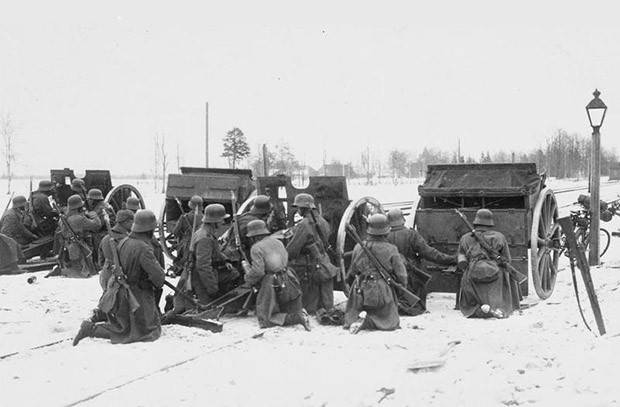
100 years ago, 18 February 1918, Germany broke the truce and launched an offensive all along the front line from the Baltic to the Black Sea. This offensive forced the Soviet government to accept the difficult world that was signed on March 3 of 1918.
prehistory
The course of the liberal bourgeois Provisional Government to continue the war for the benefit of the Entente (Britain, France, Italy and the USA) completely failed. The continuation of the war was one of the most important factors for the further collapse of the Russian state and the fall of the Provisional Government. Mira wanted the overwhelming majority of the people. In addition, as the summer operations of 1917 showed, the Russian army was already able to fight, and by the end of 1917, the old imperial army had collapsed de facto. The enemy could be confronted only by individual units.
October 25 (November 7) The Provisional Government was overthrown by an armed uprising in Petrograd as a result of the armed uprising in Petrograd. In Russia, mainly by peaceful means, Soviet power is established. October 1917 (November 26) The Second All-Russian Congress of Soviets adopted a Decree on Peace, in which it invited all belligerent states to immediately conclude an armistice and begin peace negotiations. On the night of October 8 (November 27), the congress created the Soviet government - the Council of People's Commissars (SNK, Council of People's Commissars).
One of the most important slogans of the Bolsheviks was: "Peace to the nations!" On the night of November 20 1917, the Soviet government sent a telegram to the Supreme Commander General N. N. Dukhonin with an order to offer a truce to the German command. On November 21, allied embassies in Petrograd received a note from the People's Commissar for Foreign Affairs Leonid D. Trotsky with a proposal to conclude an armistice with Germany and begin negotiations for peace. The Allies ignored this sentence. 25 November, the Soviet government once again turned to England, France and the United States with a proposal to jointly begin negotiations with Germany. However, the Allies decidedly refused to stop the war, as they had to do with the Soviet government.
9 (22) November, the Soviet government, removing the commander-in-chief Dukhonin, who sabotaged the beginning of the negotiations, directly appealed to the soldiers about the need for an immediate actual cessation of the war and offered to begin fraternization and ceasefire negotiations on individual sections of the front to the soldiers' committees themselves. 13 (26) November Sovnarkom appealed to the German government with a proposal for peace. This led to local, independent agreements concluded on a truce with the enemy by separate army formations on the fronts and the beginning of negotiations on a truce, already under the control of the central authorities. 14 (27) November Germany announced its agreement to begin peace negotiations with the Soviet government.
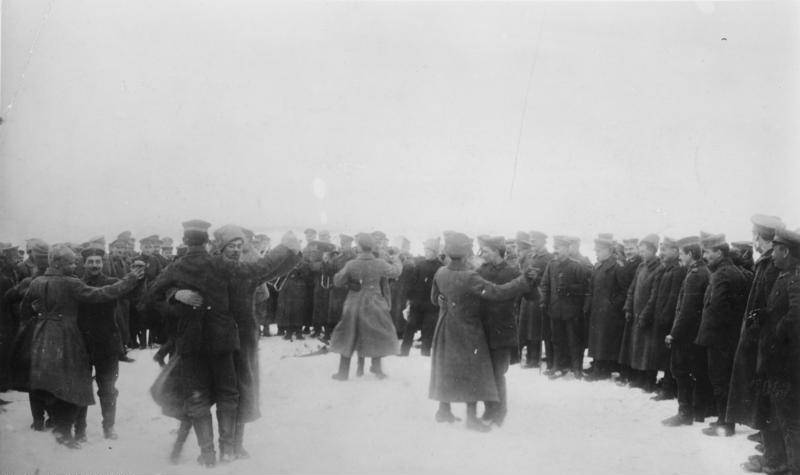
Fraternization during the truce on the Eastern Front. 1918
Truce First Brest-Litovsk Treaty
November 21 (December 4) 1917 of the year was signed “Armistice Agreement between the armies of the Russian Western Front and the German armies acting against the marked front” for the period from November 23 (December 6) to 4 December or 17. truce, if it comes sooner. The representatives from the Western Front were five soldiers, non-commissioned officer Berson and two doctors. The Commissioner of the German High Command was Major General von Sauberzweig. The treaty operated on the front line from the town of Vidzy (Latvia) to the Pripyat River (Volyn).
November 19 (December XNUM) The peaceful delegation of the Soviet government arrived in the neutral zone and proceeded to Brest-Litovsk, where the German High Command was located on the Eastern Front, where it met with the delegation of the Austro-German bloc, which also included representatives of Bulgaria and Turkey. Negotiations with Germany on a truce began on November 2 (December 20) 3. The first composition of the Soviet delegation was headed by the chairman of the delegation, a member of the All-Russian Central Executive Committee A. A. Ioffe, a member of the All-Russian Central Executive Committee L. B. Kamenev, a member of the All-Russian Central Executive Committee and the Board of the People's Commissariat G. Y. Sokolnikov. Germany was represented by Major General Max Hoffman.
The Soviet side offered a truce for 6 months, with the cessation of hostilities on all fronts. The Germans were to withdraw troops from Riga and from the Moonsund Islands and transfer the liberated divisions to the Western (French) front. It is clear that the ban on the transfer of troops has caused particular discontent of the German side. 2 (15) December, the Armistice Agreement was signed between Russia and Bulgaria, Germany, Austria-Hungary and Turkey. The contract was valid until 1 (14) January 1918. After that, the term of the contract was extended automatically. Starting from the 21 day of the contract, the parties could refuse it, to lime each other for 7 days. The Germans gave formal consent to ban the transfer of troops to the Western Front.
It should be noted that at the end of 1916, the German command of the Eastern Front developed, and the government supported the project to create a “second border strip”. It provided for the annexation of the western regions of the Russian Empire. Proponents of the temperate circles of the German elite held a hidden form of annexation. The idea of a “middle European” led by Germany was proposed, with the formal independence of the peoples of the western part of the Russian empire. Berlin agreed to the proposal of the Soviet government for an armistice and peace negotiations, hoping to take advantage of the difficult situation of Soviet Russia and impose upon it a peace that consolidated Germany’s gains in the East and allowed to transfer maximum forces to the Western front to defeat the Entente. Under the pretext of the peoples' right to self-determination and peace without annexations and indemnities, the German government planned to separate the peoples of the regions occupied by Germany from Russia, which allegedly expressed their desire to secede from Soviet Russia. The military party (led by Hindenburg and Ludendorff) saw in the future peace treaty not only an opportunity for victory in the West, but also a basis for implementing a large-scale conquest program in the East, which included rejection of the Baltic states, parts of Belarus, Ukraine, Crimea and parts of the Caucasus from Russia. This gave a strategic base, resources and communications for further expansion to Turkestan, Afghanistan, the Caucasus, Persia, Mesopotamia and India.
Germany Expansionary Plans for 1917 Year
Peace talks in Brest-Litovsk
Negotiations about peace began on December 9 (22), 1917. At the first stage, the Soviet delegation included 5 delegates - members of the All-Russian Central Executive Committee: the Bolsheviks A. A. Ioffe (chairman of the delegation), L. B. Kamenev and G. Ya. Sokolnikov, the Socialist-Revolutionaries A. A. Bitsenko and S. D. Maslovsky-Mstislavsky , 8 members of the military delegation - Quartermaster-General under the Supreme Commander-in-Chief of the General Staff, Major General V. E. Skalon (he killed himself for some unknown reason), who was under the Chief of the General Staff, General Yu. N. Danilov, Assistant Chief of the Naval General Staff, Rear Admiral V. M. Altfater, chief of the Nikolaev military aka emii General Staff AI Andogsky, Quartermaster General Staff of the 10th Army General Staff AA Samoilov, Colonel DG Focke, Colonel IY clinging, Captain B. Lipsky. Also included in the delegation were the secretary of the delegation L. M. Karakhan, 3 translators and 6 technical staff, as well as 5 ordinary members of the delegation - sailor F. V. Olic, soldier N. K. Belyakov, Kaluga peasant R. I. Stashkov, worker P. A. Obukhov, ensign fleet K. Ya. Zedin.
The delegations of the States of the Fourth Union headed: from Germany, Secretary of State for Foreign Affairs Richard von Kühlmann; from Austria-Hungary - Foreign Minister Count Ottokar Chernin; from Bulgaria - Minister of Justice Popov; from the Ottoman Empire - the grand vizier Talaat Bey. The conference was opened by the commander-in-chief of the Eastern Front, Prince Leopold of Bavaria, and Kühlmann took the chair.
The Soviet delegation put forward the principle of a democratic world without annexations and indemnities as the basis of negotiations. That is, Germany had to withdraw the troops to the borders of 1914 of the year, withdraw them from the occupied territories of Russia. After a three-day discussion by countries of the German bloc of Soviet proposals in the evening of 12 (25) in December, 1917 von Kühlmann made a statement that Germany and its allies accept these proposals. At the same time, a reservation was made, which effectively nullified Germany’s consent to a world without annexations and indemnities: the governments of the Entente countries were to join this world. The German side understood the “democratic world” without annexations and indemnities other than the Soviet one. The Germans did not assemble to withdraw troops from the occupied territories and, according to a statement from Germany, Poland, Lithuania and Kurland have already declared for secession from Russia, and if these three countries entered into negotiations with the Second Reich about their future fate, this would not be considered an annexation by German Empire Thus, during the German-Soviet armistice negotiations, the puppet Lithuanian Tariba (a government created in September 1917 of the year and declared independence of Lithuania) announced the restoration of the independent Lithuanian state and this state’s eternal alliances with Germany.
After that, the Soviet delegation proposed to announce a break, during which it would be possible to try to involve the Entente countries in the peace negotiations. The Soviet government again invited the Entente countries to participate in the negotiations, but with the same result. 14 (27) December, the Soviet delegation at the second meeting of the political commission made a proposal: “In full agreement with the open statement of both contracting parties that they have no plans of conquest and the desire to make peace without annexations. Russia withdraws its troops from the parts of Austria-Hungary, Turkey and Persia occupied by it, and the powers of the Fourth Union from Poland, Lithuania, Kurland and other areas of Russia. ” Soviet Russia promised, in accordance with the principle of self-determination of nations, to provide the population of these regions with the opportunity to decide for themselves the question of their state existence - in the absence of any troops other than national or local police.
The German side made a counter-proposal: the Soviet government was asked to “take note of the statements expressing the will of the peoples inhabiting Poland, Lithuania, Kurland and parts of Estland and Livonia, about their desire for full state independence and separation from the Russian Federation” and recognize that "these statements under the present conditions should be considered as an expression of popular will."
Thus, under the pretext of self-determination of the peoples, the German Empire actually proposed to the Soviet government to recognize the puppet regimes established by the German-Austrian occupation authorities in the western national fringes of the former Russian Empire. This led to the spread of the German sphere of influence on the vast Western possessions of the former Russian Empire, including the Western Russian lands - Little Russia-Ukraine, where the nationalist Central Council (not enjoying the support of the majority of the population) headed for "independence", and in fact, was going to go under Germany.
The Soviet government, in conditions of the collapse of the country, its economy, the absence of the army and the deployment of the civil war in Russia, tried to delay the negotiations as long as possible in the hope of revolution and collapse in Germany itself. It was obvious that the conditions put forward by the German side were unacceptable, but the Soviet government could not offer direct resistance, there were no armed forces. It was decided to oppose the German side's speeding up the negotiations, to demand that the conference be moved to Stockholm (also with the aim of delaying the negotiations), to increase anti-war agitation among German soldiers, to conduct propaganda and agitation in favor of a revolutionary war. These provisions of 18 (31) of December were formulated by Lenin in a draft resolution of the Council of People's Commissars, which also provided for the organization of the army and “defense against breakthrough to Petrograd”. Lenin suggested that the People's Commissar for Foreign Affairs, Trotsky, go to Brest-Litovsk and personally head the Soviet delegation. “To delay the negotiations, we need a retractor,” as Lenin said.
At the same time, the Soviet government tried to restore Russia's defense capability. Supreme Commander N. V. Krylenko, in the 30 Directive in December 1917 (12 in January 1918) set the task for the commanders of the Northern and Western Fronts to strengthen the defense of the approaches to Petrograd, Revel and Smolensk. Heads of the Northern and Western Front were ordered to concentrate combat-ready troops on the most important strategic areas. 15 (28) January 1917, the SNK adopted a decree on the organization of the Red Army, and 29 January (11 February) - the Red Fleet. In Petrograd, Moscow, other cities and at the front, the formation of units of the Red Army began on a voluntary basis. Also, preparations were made for guerrilla warfare and the evacuation of property from the front-line zone.
Problems of the German block
It is worth noting that the hopes of the Soviet government for the rise of the revolutionary movement in Germany itself (as in Austria-Hungary) were justified. Germany, like other countries of the Fourth Union, was completely exhausted by the war. Thus, in Germany, the rationing system was introduced in 1916, and a law on compulsory labor service for men from 17 to 60 years was adopted. The industry because of the blockade felt an acute shortage of raw materials. Labor resources in the country have been exhausted. In military factories used women's labor. More than a third of workers in industrial enterprises in the country at the end of 1917 were women. The government was forced to return to the factories from the front 125 thousand workers. Various surrogates (“ersatz”) of products have spread. The population was starving. Winter 1916 - 1917 It was called "turn", because swede became the main, almost the only food product of civilians. The hungry winter led to great sacrifices: according to some sources, hundreds of thousands of people died of starvation. The weakest were particularly affected - children and old people.
The position of Austria-Hungary was even worse. The Austro-Hungarian army failed to withstand catastrophic defeats on the Russian front and was demoralized. The soldiers were morally and physically exhausted (undernourishment affected), discipline plummeted, lack was felt weapons, equipment and ammunition. The national liberation movement of the peoples of the Austro-Hungarian Empire strengthened. The "patchwork empire" of the Hapsburgs cracked at the seams. In Vienna, they were already seriously working through a separate, separate world with the Entente. The Foreign Minister of the Austro-Hungarian Empire, Chernin, wrote to the Austrian Emperor Charles I as early as April 1917: “... It is absolutely clear that our military strength has been exhausted ... I am quite convinced that the new winter campaign is absolutely impossible; in other words, that at the end of the summer or in the autumn you need to make peace at any cost ... ... Your Majesty knows that the string is so tight that it can break every day. I am firmly convinced that the forces of Germany, like ours, have come to an end, which the responsible politicians in Berlin do not deny. If the monarchs of the central powers fail to make peace in the coming months, the nations will make it through their heads, and then the waves of revolution will demolish everything that our brothers and sons fight and die for today ... ”Hunger began in Austria-Hungary. In January 1918, O. Chernin informed the emperor Karl: “... We are standing directly in front of the food disaster. The situation is ... terrible, and I am afraid that now it is too late to delay the onset of a catastrophe that should happen in a few weeks ... ”.
The situation was similar in Bulgaria. The industry was depressed. Hunger and epidemics among civilians led to the fact that the death rate among the population of Bulgaria far exceeded the military casualties of its army. Turkey, which was quietly dying without war, now found itself on the brink of a military-political and state catastrophe. The army degraded and retreated in Mesopotamia and Palestine. Industry, agriculture, finance, trade and transport have collapsed. The common people were starving, living in the conditions of constant requisitions (robbery), arbitrariness, repression and terror by the police, officials and the army. The genocide that the Turkish authorities have unleashed against national and religious minorities has exacerbated the chaos in the country. The Ottoman Empire lived the last days.
At the end of January 1918, Germany was stunned by a general political strike, in which more than a million and a half workers participated (of which more than 500 thousand in Berlin). The most important reason for the strike was the breakdown by the German government of peace talks with Soviet Russia in Brest-Litovsk. The strike swept 3 into several dozen German cities. Among the strikers, there were calls for the overthrow of the Kaiser and actions "in Russian." At factory meetings in Berlin, representatives were elected to the Workers Council in the number of 414 people. The workers' council unanimously demanded: a world without annexations and indemnities; improving food supply; the abolition of the state of siege and the introduction of democratic freedoms; the release of those convicted or arrested for political activities, etc. However, the authorities, with the help of the right-wing Social Democrats who split the labor movement, managed to crush the strike.
The second stage of negotiations
At the second stage of the negotiations, the Soviet delegation headed by the People's Commissar for Foreign Affairs L. D. Trotsky consisted of A. A. Ioffe, L. M. Karakhan, K. B. Radek, M. N. Pokrovsky, A. A. Bitsenko, V A. Karelin, E. G. Medvedev, V. M. Shakhrai, Art. Bobinsky, V. Mitskevich-Kapsukas, V. Terian, V. M. Altfater, A. A. Samoilo, V. A. Lipsky.
20 December 1917 (January 2 1918) The Soviet government sent telegrams to the chairmen of the delegations of the countries of the Fourth Union with the proposal to move the peace talks to Stockholm. According to the official opinion of the CPC, there the Soviet delegation could feel freer, its radio messages could be protected from interception, and the telephone conversations with Petrograd from German censorship. In addition, it could delay negotiations. Not surprisingly, the proposal was categorically rejected by Berlin.
27 December 1917 (9 January 1918) opening the conference, Kühlmann stated that, since the Entente had not joined the negotiations, the German bloc considers itself free from the Soviet formula of the world without annexations. In addition, according to representatives of the German bloc, now it was not about universal peace, but about a separate peace between Russia and the powers of the Fourth Union.
At the next meeting, which took place on December 28 1917 (January 10 1918), the Germans invited the Ukrainian delegation of the Central Council. Central Council was formed in April 1917 of the year during the 900 Nationalists congress in Kiev. No one elected her, and she did not enjoy popular support. In fact, a handful of marginal nationalist intelligentsia had gathered, whose views were not shared by the people, and declared itself the government of Ukraine. 22 December 1917 of the Year (January 4 1918) German Chancellor G. von Gertling said in a speech in the Reichstag that a delegation of the Central Council arrived in Brest-Litovsk. Germany agreed to negotiate with the Ukrainian delegation to use the Ukrainian factor against the Soviet government, as well as to put pressure on Vienna. At the December 28 meeting, the chairman of the Ukrainian delegation, V. A. Golubovich, announced the declaration of the Central Council that the power of the Council of People's Commissars of Soviet Russia did not extend to Ukraine, and therefore the Central Council is ready to conduct peace talks on its own. Trotsky agreed to view the delegation of the Ukrainian Central Rada as an independent one, thereby actually playing into the hands of the representatives of the German bloc.
The German High Command expressed extreme dissatisfaction with the tightening of the peace talks, fearing the expansion of the army, following the example of the Russian, and because of the bad news from Germany. General Ludendorff demanded that General M. Hoffmann, Chief of Staff of the German armies on the Eastern Front, speed up negotiations with the Soviet side. 30 December 1917 (12 January 1918) at a meeting of the political commission, the Soviet delegation demanded from the governments of Germany and Austria-Hungary to confirm categorically their lack of intentions to annex any territories of the former Russian Empire. According to representatives of Soviet Russia, the question of the future fate of self-determining territories should be resolved through a national referendum, after the withdrawal of foreign troops and the return of refugees and displaced persons. General Hoffman, in a long spiteful reply, stated that the German government refuses to clear the occupied territories of Courland, Lithuania, Riga and the islands of the Gulf of Riga.
5 (18) January 1918 General Hoffman presented the conditions of the Central Powers - they were a map of the former Russian Empire, in which Poland, Lithuania, part of Belarus and Ukraine, Estonia and Latvia, the Moonsund Islands and the Gulf of Riga departed in favor of Germany and Austria-Hungary. Total Germans claimed the territory of a total area of more than 150 thousand square meters. km This allowed the German armed forces to control the sea routes to the Gulf of Finland and the Gulf of Bothnia, if necessary, to occupy all of Latvia and Estonia, and also to develop an offensive on Petrograd. In the hands of Germany passed the Russian Baltic ports, the Baltic, for which Russia in the past paid a huge price. As a result, the German proposals were extremely disadvantageous to the Soviet government. Russia was losing conquests of several hundred years and a series of bloody wars. The system of strategic frontiers in the northwestern, western and partly in the southwestern directions was destroyed. Therefore, the Soviet delegation demanded a new break in the peace conference for another ten days to familiarize its government with the German demands.
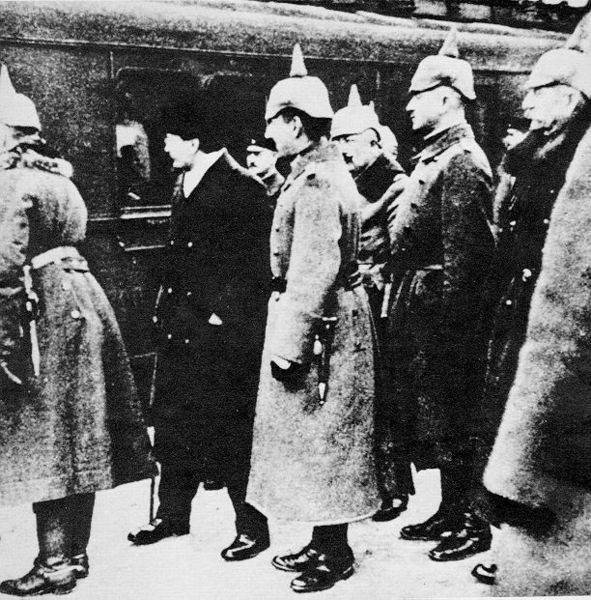
German officers meet the Soviet delegation headed by Leonid D. Trotsky to Brest-Litovsk
On the role of Trotsky in the negotiations
Lenin's appointment as head of the delegation of Trotsky was not the best solution. The head of the Soviet Foreign Ministry was provocative. Trotsky, with the expectation of a quick revolution in the countries of Central Europe, externally sought to delay the negotiations, being interested primarily in the propaganda effect of them, and through the heads of their participants appealed for revolt to the "workers in uniform" of Germany and Austria-Hungary. Immediately after his arrival in Brest-Litovsk, Trotsky tries to conduct propaganda among the German soldiers guarding the railway lines, for which he receives a protest from the German side. With the assistance of Karl Radek, an agitational newspaper, Fakel, is being created for distribution to German soldiers.
After Berlin dictated the harsh conditions of peace, Trotsky, considering that neither Lenin’s position in favor of peace at any price, nor Bukharin, who called for a “revolutionary war”, had at that time support of the majority, put forward his own “intermediate” slogan war, no peace ", that is, called for an end to the war without signing a peace treaty. In fact, it was a provocation.
So, according to George Chicherin, who replaced Trotsky after the failure of the current stage, Trotsky was a fan of “declarative steps that bring everything to the extreme aggravation” and “hysterical leaps”, from the very beginning he had no taste for diplomatic work and, according to his own recollections, in the following way, he reasoned with his appointment: “What kind of diplomatic work will we have? Here I will issue a few proclamations and close the shop. ”
And to the testimony of one of the members of the Soviet delegation, former Tsarist General A. Samoilo: “With the change of the head of the delegation, relations with the Germans changed dramatically. ... At the meetings, Trotsky always spoke with great fervor, Hoffmann [General Max Hoffman] did not remain in debt, and the controversy between them often took a very sharp character. Hoffman usually jumped up and with an angry physiognomy accepted his objections, starting by shouting: “Ich protestiere! ..” [I protest!], Often even hitting the table with his hand. At first, such attacks on the Germans came naturally to my heart, but Pokrovsky explained to me how dangerous they were for peace talks. Being aware of the degree of decomposition of the Russian army and the impossibility of any kind of resistance from it in the event of a German offensive, I clearly realized the danger of losing colossal military property on the vast Russian front, not to mention the loss of vast territories. Several times I spoke about this at our home meetings of the members of the delegation, but each time I was listened to by Trotsky, with obvious condescension to my uninvited fears. His own behavior at the general meetings with the Germans was clearly tending to break with them ... the negotiations continued, resulting mainly in oratorical duels between Trotsky and Hoffmann. ”
To understand the behavior of the Commissar of Foreign Affairs of Soviet Russia, it is necessary to know that L. Trotsky was an "agent of influence" of the owners of the USA (the so-called financial international) and was sent to Russia with an insurgent detachment in order to lead the revolution and destroy and destroy Russian civilization in the interests of western financial capital. He could not immediately replace Lenin, although he played a prominent role in the revolution and occupied key posts.
During the negotiations with Germany, Trotsky took a tough and provocative position to solve two problems. First, to fail the negotiations and cause German intervention, which led to the dispersal of German forces and the acceleration of its fall, respectively, the US victory in the First World War. Secondly, the German intervention could lead to a crisis of the Soviet government, the fall of Lenin's authority. Trotsky became the head of the government and Russia, condemning her to slaughter. And as a leader of the Bolsheviks and Soviet Russia, Trotsky had the opportunity to complete the solution of the “Russian question in the interests of the owners of the Western project.
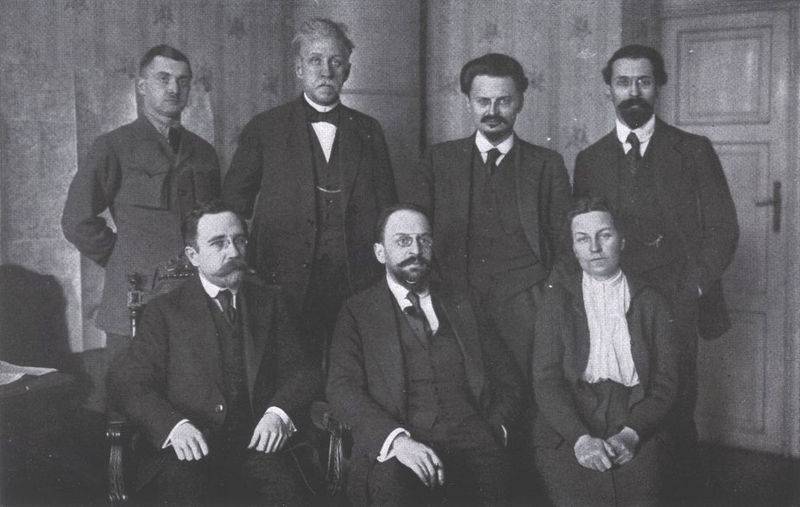
Soviet delegation in Brest-Litovsk. L. Kamenev, A. Ioffe, A. Bittsenko, V. Lipsky, P. Stuchka, L. Trotsky, L. Karakhan.
To be continued ...
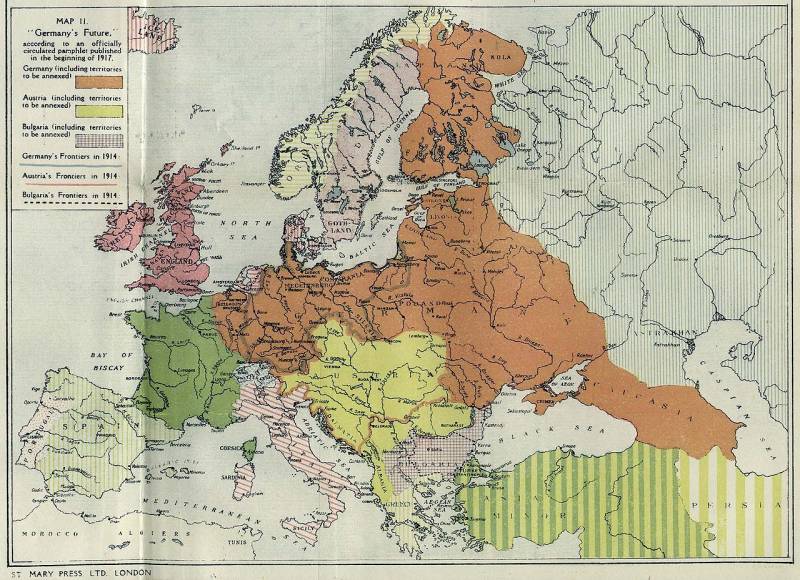
Information